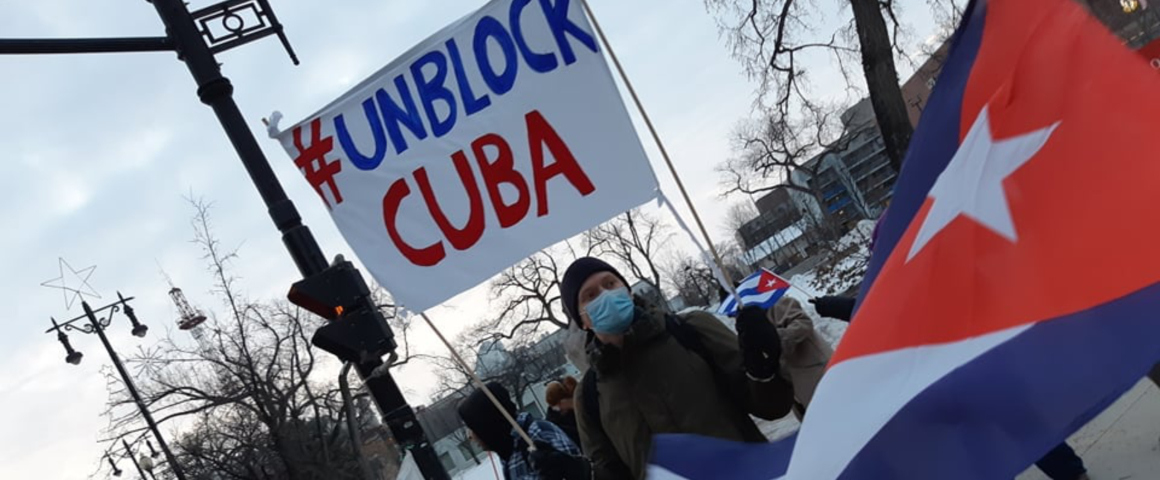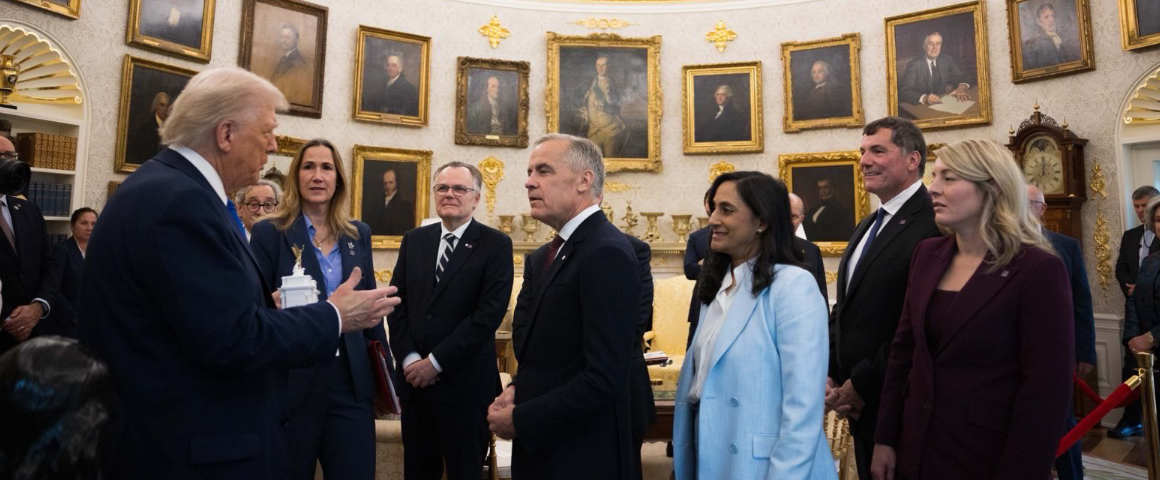By Cam Scott
It’s disappointing, if not surprising, to see the Winnipeg Free Press give so much space to Peter McKenna’s harmful mischaracterizations of the US blockade of Cuba, which he claims is so porous as to be a secondary factor in the difficulties faced by Cubans today.
“The embargo has more holes in it than Swiss cheese,” he writes in his July 8 article “The holes in the blockade on Cuba,” before speculating as to the possible benefits of black markets and offering a hastily observed list of privately owned businesses operating on the margins of the island’s planned economy.
Placing aside the author’s touristic methods of enquiry, this only attests to the many illicit and informal economies that appear alongside straitened conditions, and in no way corresponds to an easing of the illegal US blockade.
The blockade of Cuba is one of the longest and most extensive programs of economic sanctions ever perpetrated against a sovereign state, and has been condemned as such by 187 members of the United Nations General Assembly with only the United States and Israel opposed. (Ukraine abstained, in the capacity of US supplicant.) And since Trump used his final, flailing days in office to enact the hardest diplomatic sanctions on the island since 1962, the practical effects of this policy have mounted to a desperation unseen since the so-called “Special Period” following the collapse of the USSR.
On November 16 and 17, 2023, the International Tribunal against the Blockade of Cuba met in Brussels, gathering damning testimony as to the effects of US sanctions from countless experts. According to its judgement, the blockade violates countless articles of international law concerning the rights of sovereignty and self-determination, articles of the 1948 Universal Declaration of Human Rights, and the 1966 International Covenant on Economic, Social and Cultural Rights. And in light of its prejudicial intent, observers have deemed the blockade plausibly genocidal under the 1948 Geneva Convention.
The severity of the blockade could not be more clear, and yet McKenna returns from a May trip to Cuba trafficking in half-baked anecdote, supporting his claim that the impact of US encirclement has been exaggerated. “I am wondering about how religiously or rigidly the blockade is being enforced by the current US government,” McKenna writes.
But he doesn’t need to wonder. The Biden administration’s record continues the asphyxiating severity of Trump’s Cuba policy, despite a pledge to return to an Obama-era thaw. And while we can observe several recent amendments to Cuban Assets Control Regulations, facilitating an increase in small business on the island, these are self-evidently purposed at soft regime change and in no way indicate a substantially new policy direction. Where the Cuban government handled the double-edged sword of Obama’s attempts at liberalization deftly and to advantage, Biden has given almost nothing by way of opportunity or relief.
After a cursory notice of the harm caused by financial sanctions and an obligatory, half-hearted denunciation of the blockade, McKenna goes on to ask all the wrong questions. “If most other countries are not bound by the US sanctions regime, what is it that Cuba doesn’t get from the US that it can’t get from one of these other countries?”
In fact, the many related pieces of legislation by which the blockade is enforced exert onerous effects on prospective trade partners the world over. The US routinely threatens countries that do business with Cuba, and internal documents reveal a highly punitive record of withholding foreign aid to limit trade with Cuba. Title III of the Helms-Burton Act even permits federal suits by those expropriated in the 1959 Revolution against foreign companies who trade with Cuba. And Trump’s placement of Cuba on a list of “State Sponsors of Terrorism” in the last days of his presidency has effectively chilled foreign exchanges, due to the risks associated with humanitarian aid and investment.
The blockade extends to US subsidiaries as well, and as anyone who has participated in fundraising for Cuba knows all too well, it’s increasingly difficult to source medical supplies because of their many proprietary components. Under the embargo, Cubans cannot purchase equipment if more than 10 percent of its parts are made in the US. The impact of resulting shortages verges on catastrophe: at the height of the COVID-19 pandemic, Cuba, with more doctors per capita than anywhere else in the world, had a state-of-the-art vaccine – and a desperate shortage of syringes by which to administer it.
With banking restrictions as they are and no access to credit, Cubans need to pay up front for all imports, an almost impossible hurdle to trade and development that no country could clear. McKenna seems to think that currency shortages are a matter of Cuban prodigality rather than the effects of the blockade on credit: “How much of Cuba’s problem is not about getting access to imported goods and produce and more about not having the hard currency to pay for it?” This callous remark entirely misapprehends the financial instrumentation of the blockade. Of course there’s no reason for Cubans to starve in a world of plenty. McKenna could as soon remind the working poor of the vast market in amenities they can’t afford.
Beyond his incredulity of these extraterritorial sanctions, McKenna seems determined to blame the government of Cuba for present conditions, stating as a fact that “the government in Havana has been using the blockade for propaganda purposes for 65 years now.” This is a shameful characterization of Cuban resiliency and self-determination, where its government has every right to propagate the remarkable outcomes of its revolution, and a responsibility to educate its people and the world as to the truth of the blockade. The US clearly intends to demoralize the Cuban people and to destabilize their government, and in his approval of this outcome, McKenna carries water for the authors of this infiltrating policy even as he claims to oppose it.
As a politically motivated tourist, McKenna clearly mingles with a small, anti-Revolutionary stratum of Cuban society. But this is far from an exhaustive view of Cuban opinion. In a recent plenary address, Cuban President Miguel Díaz-Canel praised the popular response to shortcomings, addressing the Cuban people as “anonymous geniuses of creative resistance.” It’s a beautiful phrase, spoken in observation of the popular agency that McKenna fails to perceive as he portrays the Cuban people as passive recipients of market shocks and remote policy.
For decades, Canadian friends of Cuba have called for Canada to assert a truly independent foreign policy and to use its political leverage with the US to push for an end to the blockade. But at the same time as we make these demands of the Canadian government, we must hold our political commentary to a higher standard. McKenna’s idle provocation is both disingenuous and dangerous, and it can only harm the people for whom he proposes to speak.
Cam Scott is a member of Manitoba-Cuba Solidarity Committee
Support working-class media!
If you found this article useful, please consider donating to People’s Voice or purchasing a subscription so that you get every issue of Canada’s leading socialist publication delivered to your door or inbox!
For over 100 years, we have been 100% reader-supported, with no corporate or government funding.




